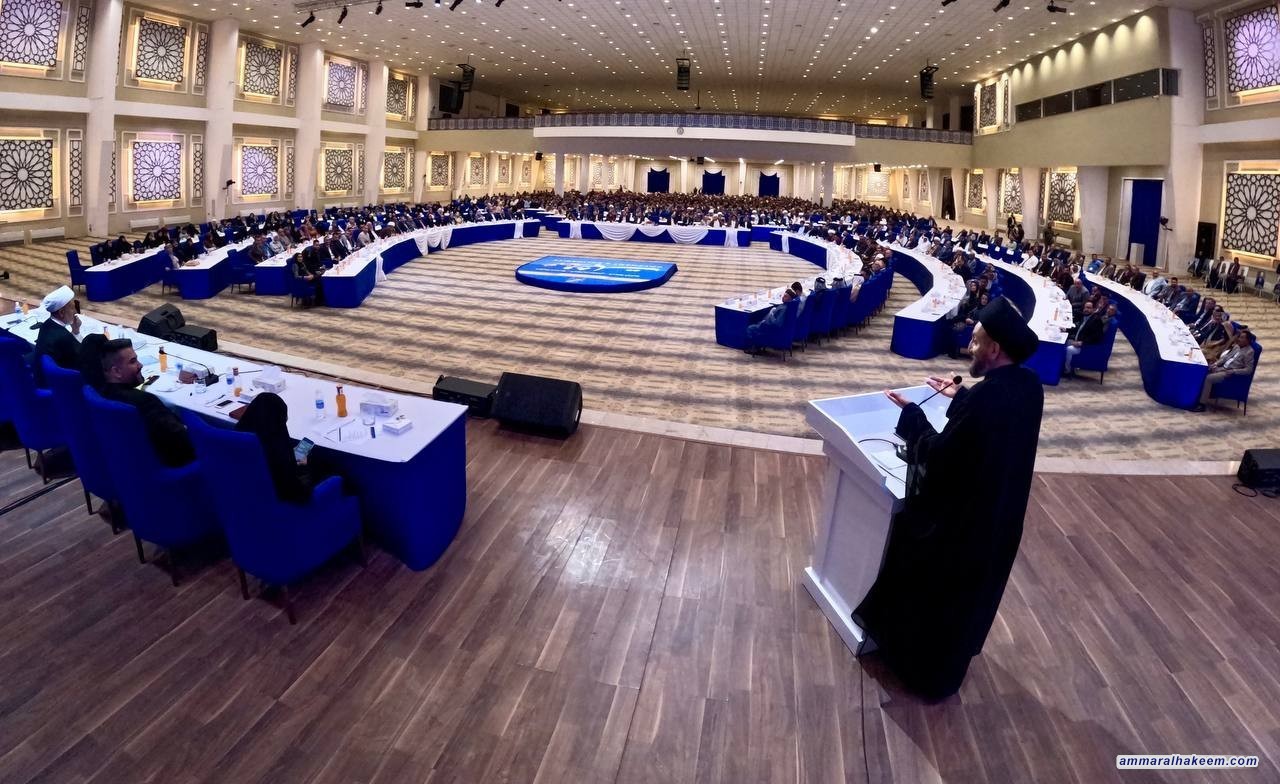Sayyid Al-Hakeem outlines preserving stability pathways through state-building, political system’s legal framework completion, combat corruption, balanced foreign policy adoption
In the second conference of the second session of the General Assembly of Al-Hikma National Movement on 14/10/2023, Sayyid Ammar Al-Hakeem, Head of Al-Hikma National Movement, renewed his congratulations on the victories achieved by the Palestinian resistance. His Eminence affirmed that these accomplishments were a result of divine guidance for an oppressed and besieged people who were subjected to the occupation of their land and the targeting of their identity by an extremist right-wing government that did not hesitate to provoke the feelings of Palestinians, Arabs, Muslims, and all well-intentioned people worldwide.
Sayyid Al-Hakeem also emphasized that the period before October 7th differs significantly from what came after. Breaking the dominance of the Israeli entity through limited means has yielded remarkable results and will pave the way for new dynamics. Israel has no alternative but to acknowledge the rights of the Palestinian people. H.E. urged for a meticulous and in-depth analysis of the statement issued by the Supreme Religious Authority, which laid out clear paths through recognizing the rights of Palestine and its people.
H.E. illustrated that the position of the Supreme Religious Authority is a continuation of the stances taken by previous religious authorities, all of whom considered the Palestinian cause to be of paramount importance. H.E. also highlighted that Imam Al-Hakeem was the first to issue a religious edict permitting the use of zakat to support the Palestinian cause and regarded those who made sacrifices for it as martyrs. H.E. underscored the significance of programs and meetings for fostering a collaborative and consultative environment among members of Al-Hikma National Movement, including the General Assembly, noting that the approach of meetings, consultations, and dialogue aligns with authentic Islamic principles.
Sayyid Al-Hakeem outlined priorities for dedicated political action, stressing the necessity for political activities to be firmly rooted in values and principles. H.E. emphasized that behavior should be guided by these values, with a commitment to observing proper social customs. H.E. stressed the importance of addressing the nation's issues, serving the people, mitigating grievances, empowering those who act with integrity, placing suitable individuals in appropriate positions, and participating in the nation's reconstruction, development, and prosperity. H.E. also emphasized that maintaining Iraq's stability and transitioning from a transitional phase to a permanent one necessitates upholding national unity, safeguarding the nation's territorial integrity, and confronting internal discord, as well as preserving the country's sovereignty against external influences. Furthermore, H.E. underscored the importance of preserving the democratic system, ensuring the peaceful transfer of power through elections, upholding the rule of law, protecting citizenship, and ensuring equal opportunities for all, without any form of discrimination.
H.E. further explained that achieving lasting stability requires the completion of the legal framework for the political system, especially laws based on constitutional provisions, such as the Oil and Gas Act, the Federal Council, and the Federal Court. H.E. emphasized the need to prevent the majority from monopolizing decision-making while preventing the minority from dictatorial rule, ensuring that neither the majority nor the minority exercises undue influence, and promoting partnerships based on national components rather than political compromises.
H.E. stressed the need for continuous encouragement of the integration of different powers, enabling citizens to prioritize their interests and preserve their voices from fragmentation. H.E. highlighted the importance of separating powers, building state institutions, and enhancing the state's administrative apparatus, with an emphasis on continuity, adherence to the rule of law, and the elimination of bureaucratic obstacles. Additionally, H.E. called for the introduction of automation and the elimination of overlapping responsibilities among state institutions, and for the development of military doctrine and the equitable distribution of security roles among concerned entities.
Sayyid Al-Hakeem urged the fight against corruption without bias based on political or sectarian affiliations, underscoring the need to target major corruption cases rather than focusing solely on minor offenders. H.E. emphasized the importance of economic diversification, resource utilization, the attraction of investors, and addressing unemployment.
In the context of nation-building, H.E. emphasized the importance of foreign policy and the maintenance of the achieved balance to transform Iraq into a unifying bridge rather than a battleground.
Regarding the priorities of the current phase, H.E. highlighted the significance of adhering to values and legitimate standards, actively countering deviant and foreign ideologies that influence our society, and embracing a sense of responsibility for the nation's issues. H.E. reiterated that true patriotism is not a mere slogan.
Governmentally, H.E. reiterated his support for the government as a top priority for the current phase. H.E. emphasized the importance of local elections for various reasons, such as being the first elections following a decade of stoppage, coinciding with substantial financial resources allocated in the budget, and offering an opportunity to enhance public services and improve service delivery in the provinces. H.E. stressed the importance of re-establishing the decentralized system, particularly since this will be the first election using the same electoral law as the upcoming parliamentary elections.
H.E. called to declare a state of general mobilization and electoral emergency, emphasizing the need to overcome any existing disagreements. H.E. also stressed the importance of steering away from a culture of negativity, frustration, and discouragement. Instead, H.E. called for a focus on fieldwork and talking, amplifying the electoral voice, utilizing acceptability, and protecting the public from targeted campaigns and defamation while providing them with factual information. Additionally, H.E. emphasized a sixth priority, which involves adhering to the plans and instructions issued by the electoral office.


/9/3/photo_2025-12-10_09-25-13.jpg)
/9/2/photo_2025-12-10_09-17-58.jpg)
/9/1/photo_2025-12-10_09-11-13.jpg)
/8/3/photo_2025-12-09_10-42-49.jpg)
/8/2/photo_2025-12-09_10-37-31.jpg)
/8/1/photo_2025-12-09_09-54-18.jpg)
/7/1/photo_2025-12-08_09-38-41.jpg)
/5/1/photo_2025-12-07_09-25-35.jpg)
/3/2/photo_2025-12-04_11-05-55.jpg)
/3/1/photo_2025-12-03_11-49-28.jpg)